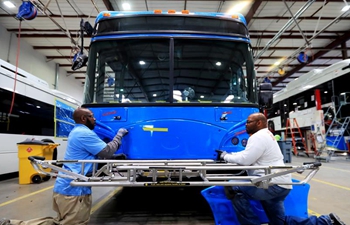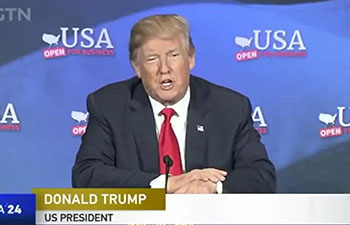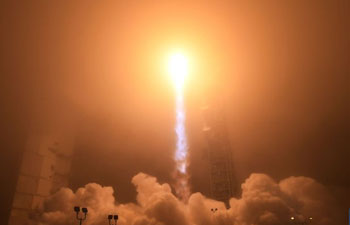By Xinhua writers Zhu Lei, Wu Xiaoling, Ye Zaiqi, Li Feihu
SAN FRANCISCO, May 7 (Xinhua) -- Despite trade disputes, the United States and China have more areas of common concern, engagement and partnership than areas of disagreement, said Gary Locke, former U.S. ambassador to China.
The disagreements on trade are significant, but the two countries are working on "many other areas of cooperation and trust," Locke told Xinhua on the sidelines of the annual conference of a prominent Chinese American group, the Committee of 100 (C100), over the weekend.
"The United States and China are actually working very closely together on many, many other issues, on scientific research, on medical research, fighting global terrorism, and stopping piracy off the coast of Africa," he said.
Their cooperation also covers the Iran nuclear issue and the Korean Peninsula nuclear issue, said Locke, who was also former governor of U.S. state of Washington and former U.S. Secretary of Commerce.
"Even though the United States and China have always had disagreements, we've always been able to move forward and continue the partnership and engagement in other issues, people-to-people exchange, scientific exchange, working on climate change, fighting global terrorism, even having cooperation on our militaries," he said.
"So we just need to focus on the areas of common interest, common goals, and try to minimize the areas of disagreement and where we do have disagreement, we need to continue to find ways to solve and reach a resolution," he said.
Speaking of bilateral economic relationship, Locke told an audience of more than 500 leaders and experts in government, business, technology, academia, and media attending the two-day C100 conference that the two countries are increasingly economically interdependent since China's opening-up.
"Today, roughly 1.5 billion dollars of goods and services flow between our two countries every single day," he said in a keynote speech on Saturday. "China is our largest export market outside of North America, with exports to China growing at twice the rate as exports to the rest of the world, and America is China's largest export market exceeding exports to all of the EU countries combined."
"More than 900,000 American jobs depend on producing goods and services exported to China and more than 2.6 million jobs in the U.S. and many, many millions more in China depend on two-way trade between our two countries, so people in both countries are benefiting from this deepening economic integration," he added.
As for the trade disputes between the two countries, Locke told Xinhua that he was glad that the two countries will have further consultations after the trade talks in Beijing.
"I don't think it was realistic to expect that in their first time meeting that they could reach an agreement. The issues are too difficult, too complex and many more meetings will be required," the former ambassador said.
Locke said even though the United States has serious concerns about some of the trade and economic policies of China, "I don't agree with using tariffs as a way to seek changes in other countries. We don't need to start a trade war."
"A trade war is bad for both countries. There are no winners. Everybody loses especially the workers, consumers and companies," he added.















